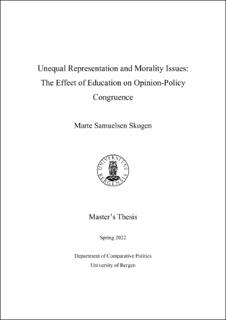| dc.description.abstract | A government must be responsive to all its’ citizens for a democracy to thrive, meaning that all individuals must be politically equal. This entails that their preferences are equally influential on the government’s decisions, regardless of personal background. The thesis looks at (un)equal representation by analysing opinion-policy congruence for different educational groups on issues related to morality. Much research has been done on congruence between opinions and policy output, but in-depth analyses on morality policy are lacking. Research has demonstrated political inequality between groups with different levels of education, wherein government policy is more responsive to higher educated citizens. The combination of the higher educated citizens increasingly dominating the political arena and their preferences on morality issues being substantively different from those with lower levels of education make it likely for there to be unequal representation related to morality policy. Applying pooled OLS regression analyses with time-series cross-sectional data on European- and OECD countries, I find that the higher educated citizens are indeed better represented both generally and when their opinions differ from those of lower educated citizens. It has long been argued by social scientists that public opinion shapes the government’s policy output, but also that the influence varies according to the presence of certain political institutions and the characteristics of the relevant issues. Institutions and partisan actors influence may condition representation by creating differences in access to policymaking for subgroups of the population. This is investigated by applying a political veto points and players framework. It is argued that an increased number of veto points and players decrease unequal representation for citizens with different educational backgrounds as the higher number of veto points and players both allow for more avenues of influence and create a bias toward the status quo. Both benefits lower educated citizens whose preferences are generally more conservative. The result of the analyses of interaction effects shows that institutions do not affect whose preferences are reflected in policy. However, it indicates that the presence of more partisan veto players does. | |
